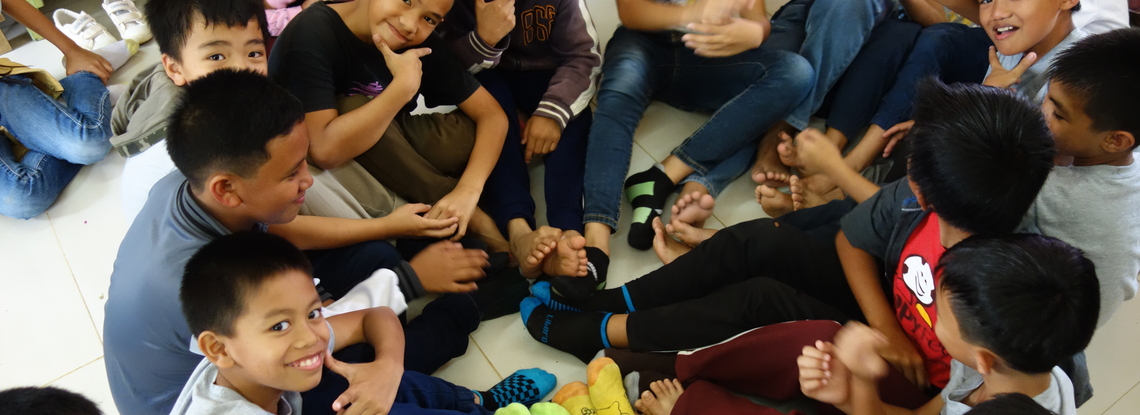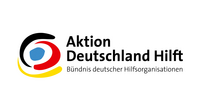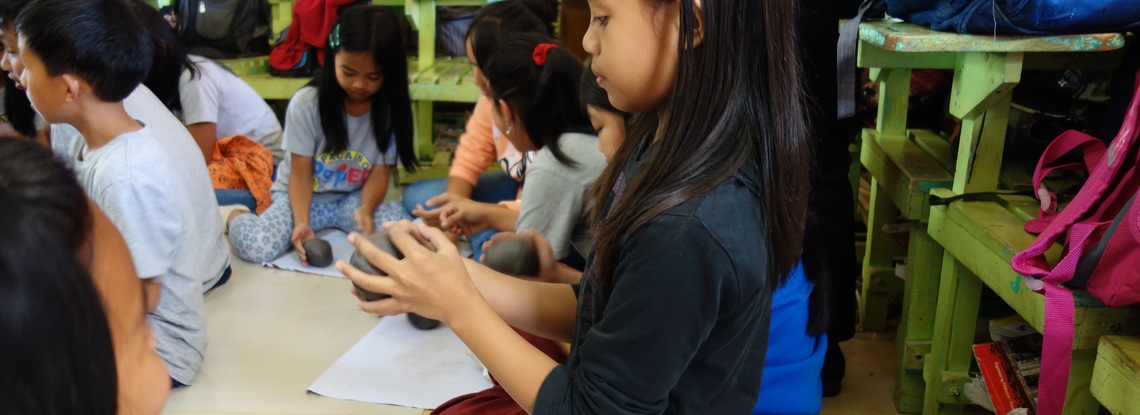Emergency pedagogy after the landslide in the Philippines


Itogon Landslide in Pacalso Elementary School, Benguet
September 30-October 5, 2018
Preliminary work done significantly contributed to the feasibility of the mission. The tripartite relationship of having a local partnership with Balay Sophia, pool of local EP practitioners, and Freunde, provided the necessary structure to have a team comprised of people with their specific expertise. Balay Sophia, a Waldorf School, facilitated the preliminary work such as site identification and ocular visits, networked with key leaders, coordinated schedules, mobilized parents and volunteers. Essential to the mission was the daily assessment and planning of the team, which recognized individual and group concerns. Prior to the actual activities with the children, the team had the opportunity to converse with the teachers (who were also victims of the landslide). This meaningful vicarious experience has strengthened empathy and commitment of the team.
On site, the team composed of 10 facilitators conducted a 3-day activity with approximately 380 children in the mornings. In the afternoon, Freunde gave an EP public lecture to 20-30 professionals who came inconsistently. Balay Sophia committed to provide weekend workshops to those professionals who signified interest to learn more about the Waldorf pedagogy and methods that can be used for trauma work.
The Pacalso Elementary School served as one of Evacuation Centers of the disaster. From the accounts of the teachers, a minority of the children attending the EP activities were directly affected by the landslide. Majority of the children of migrant miners directly affected were displaced. The school gym served as a storage for some caskets. Children would then continue to play in the gym while the caskets were on the side.
The children especially the boys exhibited behaviors of aggression (e.g. hitting and kicking, shouting mean words, rowdiness, pushing each other in line, grabbing hands to get a space and excluding specific classmates). In the Kindergarten particularly, many children exhibited physical symptoms like frequent stomachache and vomiting. It was a challenge to let the children form a circle, quiet them down and listen. Some children who were excluded cried. The need for attention was high.
Teachers disciplined the children by shouting, reprimanding by hitting the children with a stick or pinching their ears. The teachers were stressed out managing the children and had some form of aggression and abuse in their way of disciplining the children. They said that they were relieved that Freunde and friends were there to do activities with the children because they still have a lot of other school work to do. Very few were interested to participate, or some said they were not aware that they could participate. Some inquired what the team was doing in relation to trauma work. They had assumptions that the team will be interviewing the children like what previous organizations had done.
It was on the third day the measurable results of the intervention done could be seen. For instance, the system for art activities were evident to the children without the facilitators prompting them. Forming a circle and lines were more possible. More children participated in the morning circle and became familiar to the rhythm of saying a verse, singing then doing a movement. The combination of doing an indoor and outdoor activity proved to be beneficial. In clay work, even if the space was very limited, they clay work with a building up of a story was successful. The children made wonderful forms depicting the family in the story “The Giant Turnip.” The children were asking when we are coming back. Teacher became interested on how the activities can help traumatized children. The teachers were surprised that eventually the children were able to sit down to listen to the story.
Lastly, the team was surprised with a community indigenous music and dance as gift of gratitude. Initiated by Lukas, the team joined the dance and it was a joyful meeting of individuals with different cultures.
(Ester Samaniego)
Emergency Pedagogy Workshop in Manila
6.-7. Oktober 2018
A day after the Freunde team returned to Manila, an EP training workshop was held at a Jesuit university on October 6-7. The Freunde team, assisted by local EP practitioners, taught 33 participants the basic tenets of emergency pedagogy.
The weekend workshop was attended by volunteers and staff of church and non- government organizations who worked with Manila’s urban poor families affected by the Duterte government’s “War on Drugs.” At least 23,000 people, including children, have been extrajudicially killed by the police in the last three years, and the State has done little to support the families left behind. Children, traumatized by witnessing their parents gunned down, continue to live in fear. During the first year of the Duterte administration, some 28,000 children were orphaned by this War on Drugs.
(Susan Quimpo)












